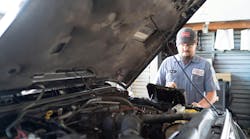The recent signing of the Massachusetts Right to Repair bill marks the first victory for “right to repair” legislation. It may be the first step towards a federal law requiring car makers to make diagnostic and repair information available to independent shops on fair and reasonable terms. (To read the law, go to http:/tinyurl.com/H043062.)
The Massachusetts law does not take effect until 2018. In the meantime, the state victory gives impetus to other states and the federal effort. The law marks the first successful compromise between proponents and opponents of “right to repair.”
Keeping up with the pros and cons of this issue is a time consuming task, but it’s one that every aftermarket player should do. All segments of the aftermarket industry stand to gain or lose in some way, depending on what the government does or doesn’t mandate automakers to do.
While the AAIA has supported “right to repair,” feedback from independent repair shops in the wake of the Massachusetts law does not reflect unanimous support.
Jacques Gordon, former editor of Professional Tool & Equipment News, posed the question, “What will change?” in his blog shortly after the Massachusetts governor signed the law. The overall reader response was “not much.” (Go to http://www.vehicleservicepros.com/blog/10754197/what-will-change).
Readers who took the time to weigh in did not think the law will make independent shops more competitive with dealerships, seeing that independents already have good information resources. Readers also felt the issue should not overshadow the more pressing need of technician education.
Are these sentiments just a dissenting minority?
A search of other automotive Internet websites also yielded less-than-enthusiastic support for the Massachusetts measure which, according to news reports, had the support of close to 1,000 technicians in that state.
PTEN has not conducted a scientific reader survey on the issue. But if the informal feedback to date is any indication, a united front is far from established, which has potentially long-range implications. Let’s consider a few.
The lobbying efforts to promote “right to repair” require funding, which ultimately comes from individual industry members.
Regulations, once they become law, impose enforcement costs, which come from industry and consumers.
Most important of all, perhaps, is that the repair industry’s public image will be affected in ways that are difficult to quantify but nonetheless real.
Consumer surveys indicate the public overwhelmingly supports “right to repair.” A survey in November 2011 by AutoMD.com, an auto-repair-information website, found 83 percent of 2,800 car owners favored right-to-repair legislation, The Wall Street Journal reported. As lobbying continues, the general public will become more educated about “right to repair.” In time, independent repair shops may face questions about their access to copyright-protected parts.
Some shop owners have expressed concern the lobbying encourages consumers to question the independent repair shop’s abilities.
AAIA President and CEO Kathleen Schmatz hailed the Massachusetts bill as a global victory during a Right to Repair Symposium in Frankfurt, Germany.
It is incumbent upon all aftermarket industry members to know where they stand on this issue and communicate their views accordingly.
Industry unity becomes critical as lobbying, lawmaking and regulation intensify.


